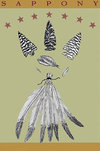 Official logo of the Sappony | |
| Named after | Saponi people |
|---|---|
| Type | state-recognized tribe, [2] nonprofit organization [1] |
| EIN 56-1966338 [1] | |
| Legal status | Trade associations; business and community development organization; arts, culture, and humanities nonprofit, chariy [1] |
| Purpose | A23: Cultural, Ethnic Awareness [1] |
| Location | |
| Membership | 850 |
Official language | English |
Executive Director | Dante Desiderio [1] |
Treasurer | Charlene Martin [1] |
| Revenue | $96,996 [1] (2019) |
| Expenses | $54,912 [1] (2019) |
| Funding | grants, contributions, investment income and dividends [1] |
| Website | sappony |
Formerly called | Indians of Person County [3] |
The Sappony are a state-recognized tribe in North Carolina. [2] They claim descent from the historic Saponi people, an Eastern Siouan language-speaking tribe who occupied the Piedmont of North Carolina and Virginia.
Contents
They were historically called "old issue negroes" in 1887, when granted a separate school, after which their name changed from "Mongolians", to "Cubans", to the Indians of Person County. [4] [3] They are based in Roxboro, the seat of Person County, North Carolina. [1]
The Sappony are not federally recognized as a Native American tribe and have never petitioned for federal recognition. [2] [5] [6]